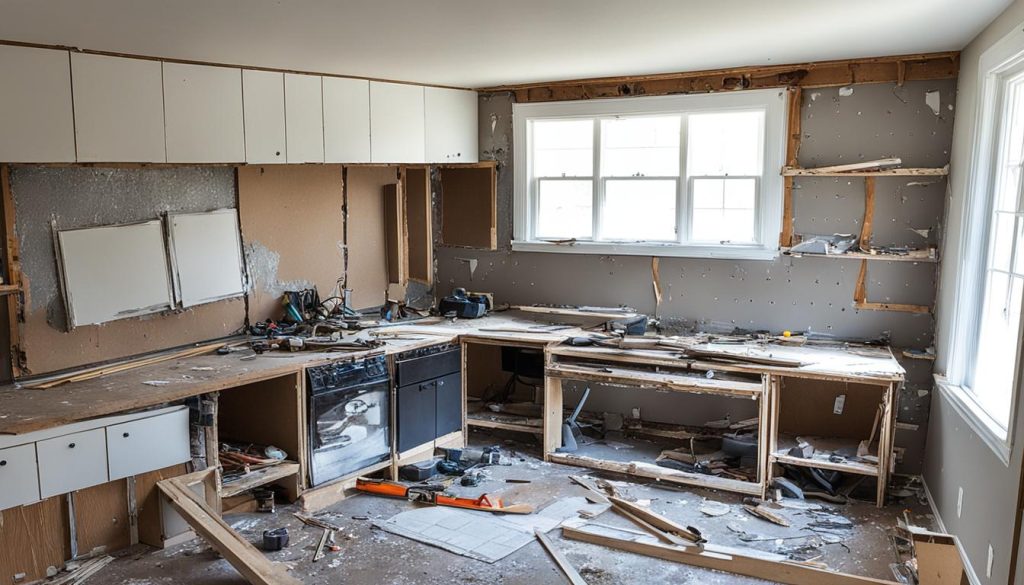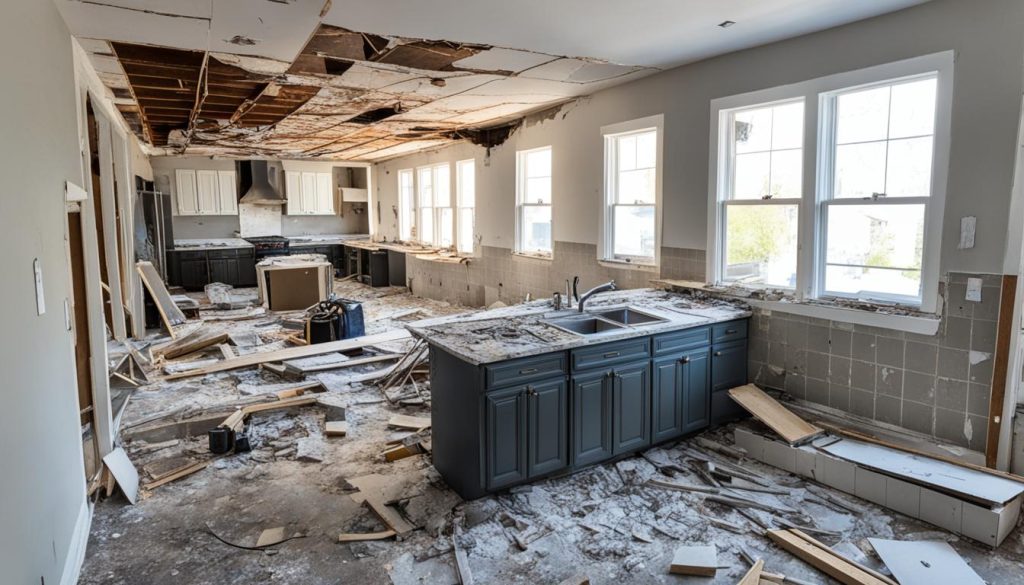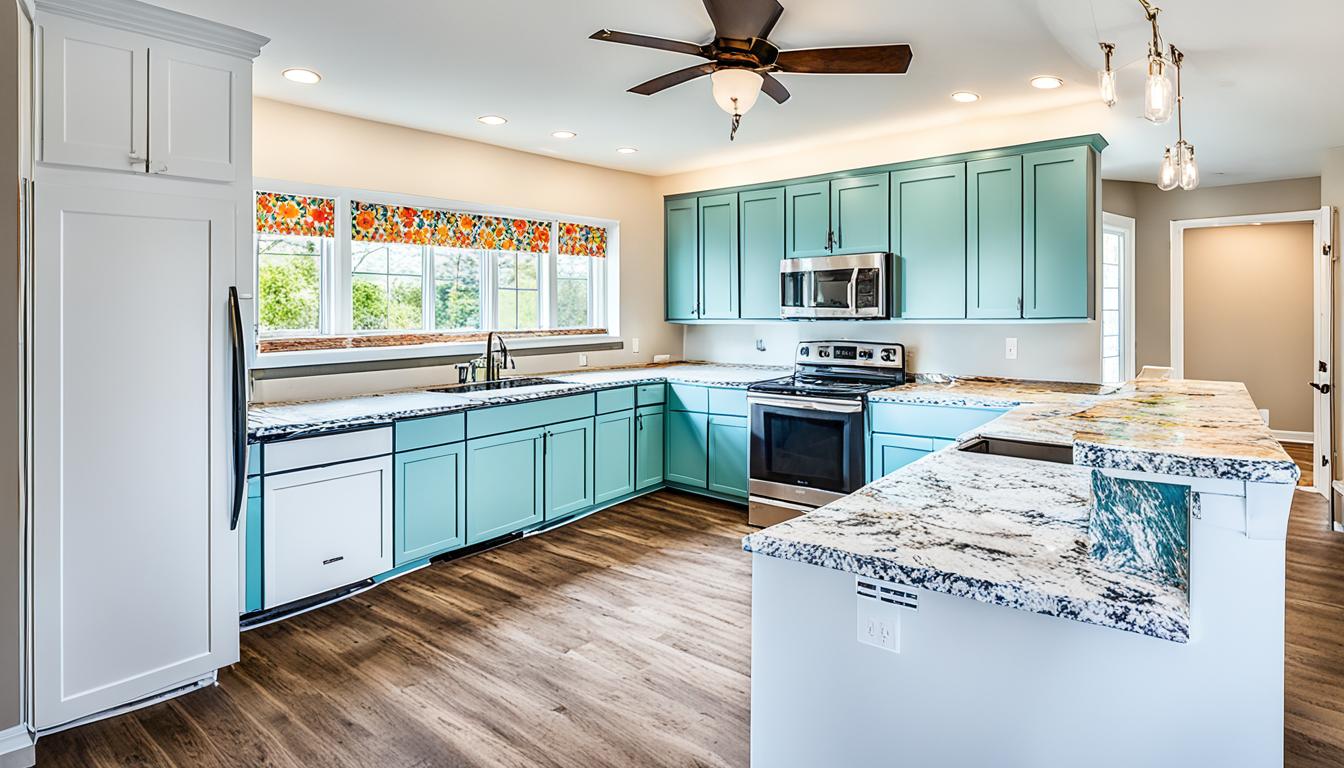Did you know that the average kitchen remodel can take anywhere from 1 to 6 months to complete? That’s right! The time it takes to renovate a kitchen can vary greatly depending on factors such as the size of the project, complexity of the design, and unforeseen issues that may arise along the way.
Planning a kitchen renovation can be both exciting and daunting, but having a clear understanding of the timeline can help you manage your expectations and ensure a successful outcome. In this article, we will explore the factors that affect the kitchen renovation timeline, provide tips for managing the process, and give you an idea of what to expect at each stage of the renovation.
Key Takeaways:
- The time it takes to renovate a kitchen can vary from 1 to 6 months.
- Factors such as the size and complexity of the project can affect the timeline.
- Proper planning and communication with your contractor are crucial for a smooth renovation process.
- Each stage of the renovation has its own timeline and specific tasks that need to be completed.
- Having realistic expectations and being prepared for potential delays is important.
Factors Affecting the Kitchen Renovation Timeline
When it comes to renovating your kitchen, there are several factors that can influence the timeline of the project. Understanding these factors is essential for planning and scheduling your kitchen renovation effectively.
Size and Complexity of the Project
The size and complexity of the kitchen renovation project play a significant role in determining the timeframe. A small-scale renovation, such as updating cabinet doors and countertops, may take less time compared to a full-scale remodel that involves structural changes and custom installations. It’s important to evaluate the scope of work and consider how it will impact the overall renovation timeline.
Availability of Materials
The availability of materials can also affect the timeline of your kitchen renovation. If you choose specialized or custom-made materials that require longer lead times for production and delivery, it can cause delays in the project. It’s important to work closely with your contractor and suppliers to ensure timely procurement of all necessary materials.
Permits and Inspections
Obtaining permits and scheduling inspections can add additional time to the kitchen renovation process. Depending on your location and the extent of the renovation, you may need to secure permits for structural changes, plumbing, electrical work, and more. The time required for permit approvals and inspections should be factored into your renovation schedule.
Unexpected Issues or Delays
During a kitchen renovation, it’s common to encounter unexpected issues or delays that can impact the timeline. These issues can range from hidden structural problems to delivery delays for materials. It’s important to allocate some buffer time in your renovation schedule to account for any unforeseen circumstances that may arise.
| Factors | Average Time Impact |
|---|---|
| Size and Complexity of the Project | Varies based on project scope |
| Availability of Materials | Potentially significant delays if custom or specialized materials are chosen |
| Permits and Inspections | Additional time needed for permit approvals and inspections |
| Unexpected Issues or Delays | Unpredictable, depends on project-specific challenges |
Planning and Preparation for a Kitchen Renovation
Before embarking on a kitchen renovation project, it’s crucial to plan and prepare accordingly. This entails considering several key factors that will contribute to a successful remodel. By taking the time to plan out your kitchen remodel and carefully considering what needs to be done, you can ensure a smooth and efficient renovation process.
1. Determine Your Budget
One of the first steps in planning a kitchen remodel is establishing a realistic budget. Consider how much you are willing to invest in the renovation and allocate funds accordingly. Keep in mind that unforeseen expenses may arise, so it’s essential to include a contingency budget to cover any unexpected costs.
2. Select a Contractor or Designer
Choosing the right contractor or designer is vital to the success of your kitchen renovation. Research and interview multiple professionals to find someone who understands your vision, has experience in kitchen remodeling, and fits within your budget. Don’t hesitate to ask for references and examples of their previous work.
3. Obtain Necessary Permits
Depending on the scope of your kitchen remodel, you may need to obtain permits from your local municipality. Check with your contractor or the city’s building department to ensure you comply with all regulations and obtain the necessary permits before commencing any work.
4. Create a Design Plan
A well-thought-out design plan is crucial for a successful kitchen renovation. Consider the functionality, aesthetics, and flow of your new kitchen. Take into account your lifestyle, cooking habits, and storage needs. Consult with a kitchen designer if needed to help you create a detailed plan that aligns with your vision.
| Benefits of Planning and Preparation |
|---|
| 1. Streamlines the renovation process. |
| 2. Helps avoid potential delays and setbacks. |
| 3. Ensures a clear understanding of the project scope. |
| 4. Facilitates effective communication with contractors and designers. |
| 5. Allows for proper budget allocation and spending. |
By following these steps and thoroughly planning and preparing for your kitchen renovation, you’ll set yourself up for a successful and stress-free remodeling experience. Remember, attention to detail and careful consideration of all relevant factors are key to achieving the kitchen of your dreams.
Stages of a Kitchen Renovation
A kitchen renovation involves several stages that must be completed in a step-by-step manner. Each stage has its own timeline and specific tasks to ensure a successful and efficient kitchen remodeling process.
- Planning: This stage involves creating a design plan for your new kitchen, determining your budget, and selecting materials and finishes. It’s important to consult with a contractor or designer to make informed decisions and ensure that your vision for the kitchen is realized.
- Demolition: In this stage, the existing kitchen is removed to make way for the new design. Walls, flooring, cabinets, appliances, and fixtures are all taken out, creating a blank canvas for the renovation.
- Rough-in: During this stage, any necessary structural changes, electrical work, and plumbing installations are completed. This includes repositioning electrical outlets, installing new lighting fixtures, and modifying plumbing connections.
- Inspection: Once the rough-in stage is complete, an inspection is typically performed to ensure that all work meets building codes and regulations. This step ensures that the kitchen renovation is safe and up to standard.
- Finishing: The final stage involves the installation of new cabinets, countertops, flooring, appliances, and fixtures. This is where your vision for the kitchen comes to life, and attention to detail is crucial to achieve the desired outcome.
A step-by-step guide to kitchen renovation ensures that each stage is completed in the correct order and allows for efficient progress. By following these stages, you can achieve a successful kitchen renovation that meets your expectations and enhances the functionality and aesthetic appeal of your space.

Average Timeframes for Each Stage of a Kitchen Renovation
The duration of each stage in a kitchen renovation project can vary depending on factors such as the size and complexity of the remodel. While every renovation is unique, the following timeframes provide a general guideline for the average duration of each stage:
- Planning Stage: 2-3 months
- Demolition Stage: 1-2 weeks
- Rough-in Stage: 1-2 weeks
- Inspection Stage: 1-2 days
- Finishing Stage: 2-3 months
It’s important to note that these timeframes are approximate and can vary depending on the specific requirements of each project. The planning stage, which involves designing the layout, selecting materials, and obtaining necessary permits, typically takes the longest. The demolition, rough-in, and inspection stages involve physical changes and installations, and they can be completed within a few weeks. Finally, the finishing stage, including paint, flooring, and the installation of fixtures and appliances, often takes several months to complete.

| Stage | Duration |
|---|---|
| Planning | 2-3 months |
| Demolition | 1-2 weeks |
| Rough-in | 1-2 weeks |
| Inspection | 1-2 days |
| Finishing | 2-3 months |
Tips for Managing the Kitchen Renovation Timeline
When it comes to renovating your kitchen, managing the timeline is crucial for a smooth and successful project. By following these tips, you can ensure that your kitchen remodel stays on track and stress-free.
- Have a clear plan and budget: Before diving into your kitchen renovation, take the time to create a detailed plan and establish a realistic budget. This will help you stay focused and make informed decisions throughout the process.
- Communicate effectively with your contractor: Open and honest communication with your contractor is key to managing the timeline. Clearly express your expectations and ask questions to ensure you’re on the same page.
- Stay organized: Keep all important documents, such as permits and receipts, in one place. This will help you stay organized and easily track the progress of your renovation.
- Anticipate potential delays: It’s important to be prepared for unexpected issues or delays that may arise during your kitchen remodel. Building in some extra time in your timeline will help you handle any unforeseen circumstances more effectively.
- Be flexible: Flexibility is key when it comes to managing the kitchen renovation timeline. There may be times when adjustments need to be made, so it’s important to remain flexible and adaptable throughout the process.
By following these tips, you can effectively manage your kitchen renovation timeline and ensure a smooth and successful project.
| Tip | Description |
|---|---|
| Have a clear plan and budget | Create a detailed plan and establish a realistic budget for your kitchen renovation to stay focused and make informed decisions. |
| Communicate effectively with your contractor | Openly communicate your expectations and ask questions to ensure a clear understanding with your contractor. |
| Stay organized | Keep all important documents in one place to stay organized and easily track the progress of your renovation. |
| Anticipate potential delays | Be prepared for unexpected issues or delays by building in extra time in your timeline. |
| Be flexible | Stay flexible and adaptable throughout the renovation process to handle any necessary adjustments. |
Expected Duration of a Kitchen Renovation
The expected duration of a kitchen renovation can vary depending on the specific project. On average, a small kitchen remodel may take around 1-2 months, while a full-scale remodel that involves structural changes and custom features could take 3-6 months or longer. It’s important to have realistic expectations and to allow for potential delays or unexpected issues during the renovation process.
When planning your kitchen renovation, consider the scope of the project and the level of customization you desire. Smaller remodels that focus on cosmetic upgrades, such as cabinet refacing or countertop replacements, can generally be completed within a shorter timeframe. However, larger-scale renovations that involve extensive structural changes, such as removing walls or relocating plumbing and electrical, typically require more time for planning, designing, and execution.
Factors such as the availability of materials, the complexity of the design, and the scheduling of contractors and subcontractors can also impact the duration of the renovation. It’s essential to work closely with your contractor to develop a realistic timeline and to communicate any specific deadlines or time constraints you may have.
During the renovation process, it’s important to anticipate potential delays or unexpected issues that may arise. These could include discovering hidden structural problems, encountering permit or inspection delays, or experiencing supply chain disruptions. By allowing for some flexibility in the timeline and working closely with your contractor to address any challenges that arise, you can minimize frustration and ensure a smoother renovation experience.
Average Timeline for Different Kitchen Renovation Projects:
| Kitchen Renovation Type | Average Duration |
|---|---|
| Small Kitchen Remodel (cosmetic upgrades) | 1-2 months |
| Medium-Sized Kitchen Remodel (minor structural changes) | 2-4 months |
| Full-Scale Kitchen Remodel (major structural changes and custom features) | 3-6 months or longer |
Keep in mind that these timelines are just averages and can vary depending on individual circumstances. It’s important to discuss your specific project details and timeline expectations with your contractor to get a more accurate estimate.
While a kitchen renovation may take some time to complete, the end result will be worth the investment. By having a realistic understanding of the expected duration and working closely with your contractor, you can ensure a successful and satisfying kitchen renovation experience.
Conclusion
In conclusion, the timeline for a kitchen remodel can vary significantly based on various factors. While there is no one-size-fits-all answer to how long it takes to renovate a kitchen, it’s crucial to plan ahead and have realistic expectations.
Effective communication with your contractor is key to ensuring the smooth progress of your kitchen renovation. By discussing your goals and timeline early on, you can work together to create a feasible plan that meets your expectations.
Being prepared for potential delays is also important. Unforeseen issues, such as supply chain disruptions or unexpected structural problems, can impact the timeline. By allowing for flexibility and having contingency plans in place, you can navigate these hurdles more smoothly.
Ultimately, a successful kitchen renovation is the result of careful planning, effective communication, and realistic expectations. By following these guidelines and working closely with your contractor, you can achieve the kitchen of your dreams while minimizing delays and ensuring a satisfying outcome.

Leave a Reply
You must be logged in to post a comment.